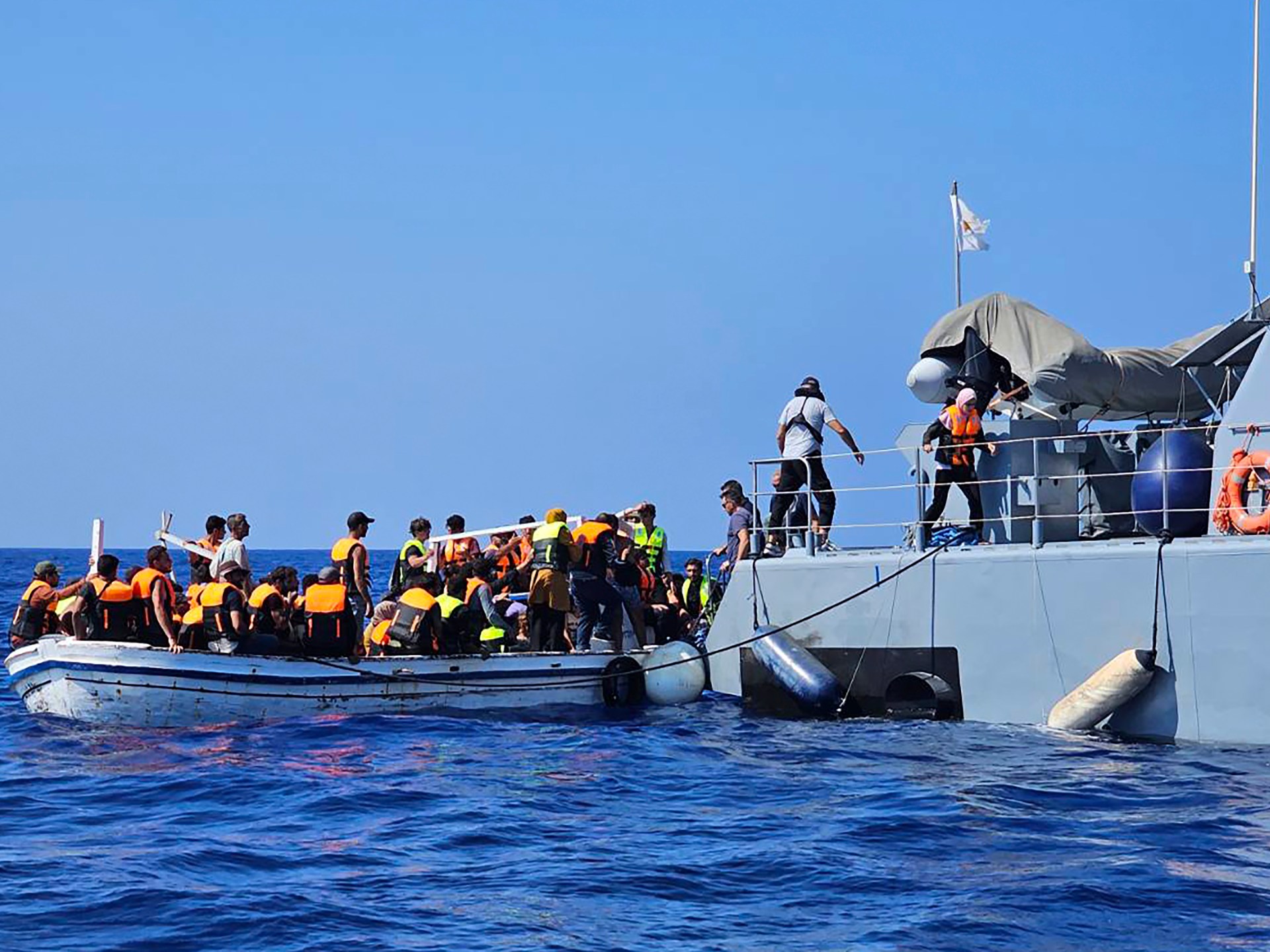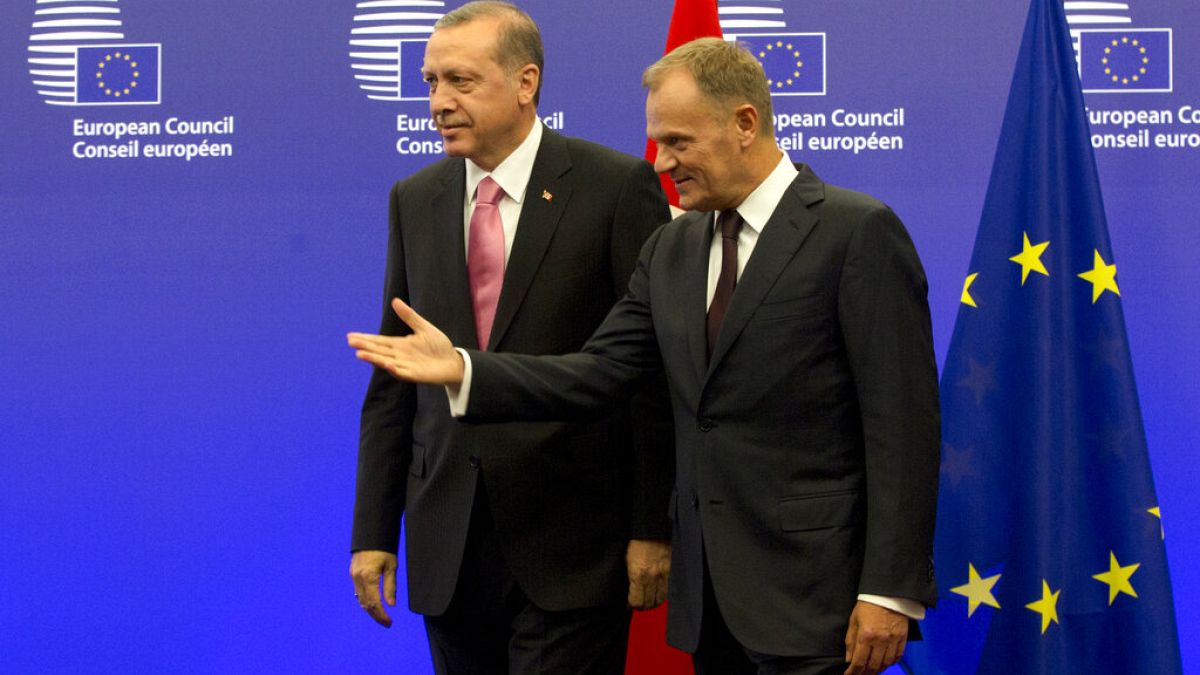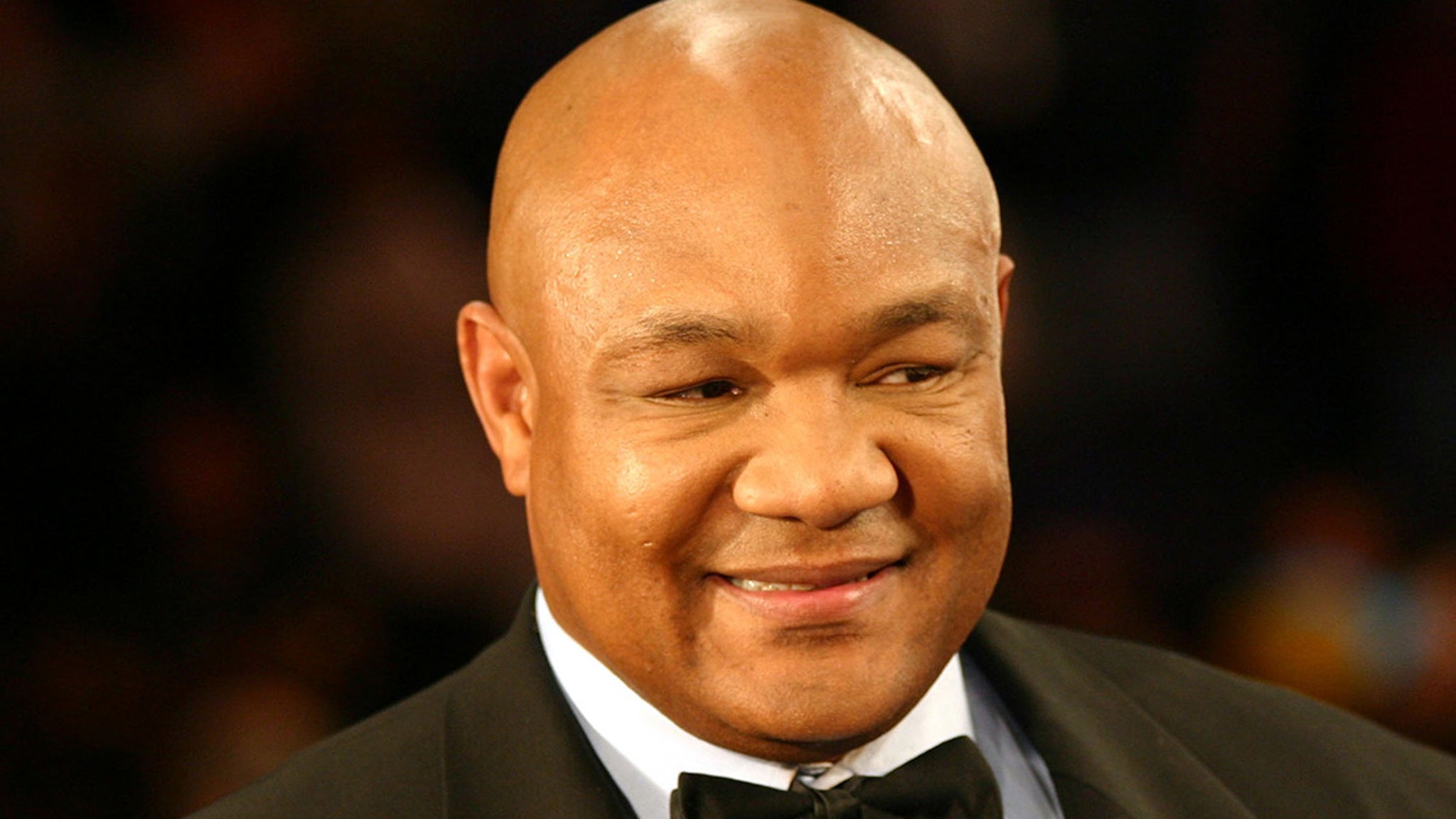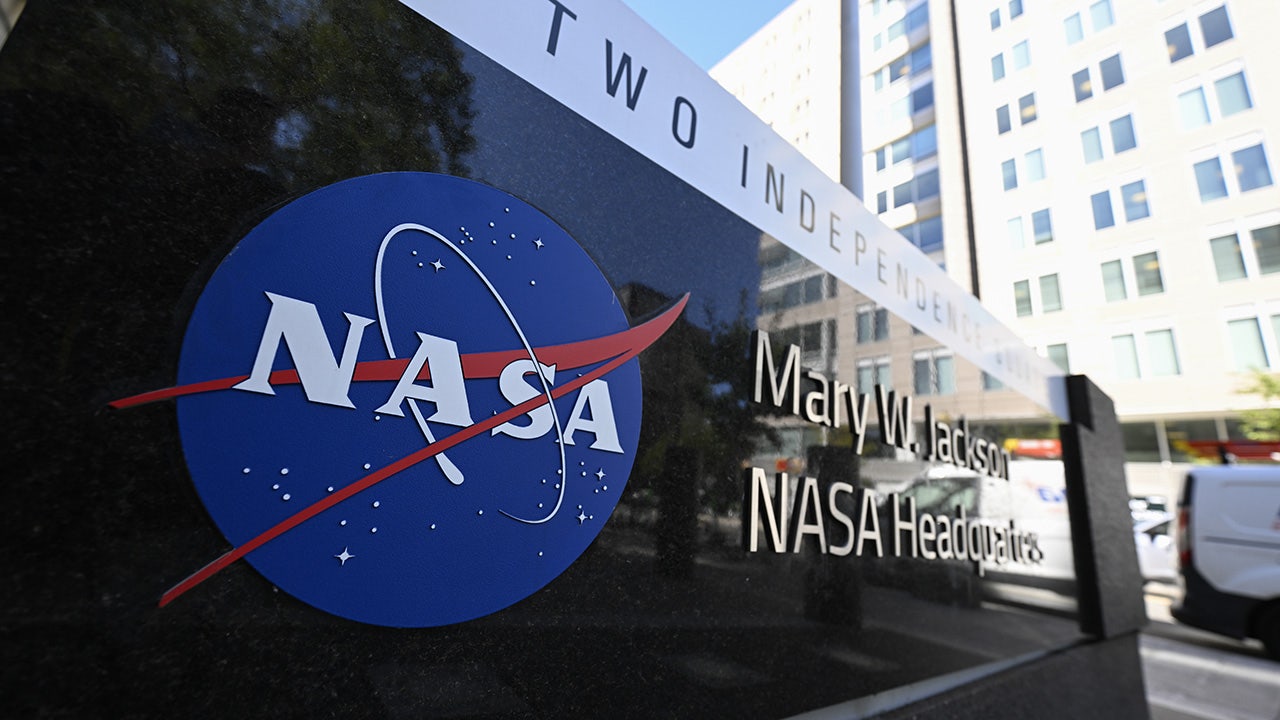World
Analysis: Concerns raised in Brussels over EU-Tunisia migration pact

Concerns are increasing in Brussels over the July migration pact agreed between the European Union and Tunisia with analysts saying European aid is increasingly being used to prop up authoritarian and autocratic leaders in North Africa.
The EU Ombudsman’s office asked the European Commission how it intends to monitor the rights of those affected and what assessment was made of its impact on rights before its signing.
The deal will see the EU give Tunisia 100 million euros ($106.6m) to combat undocumented immigration.
However, the agreement with Tunisia, pitched at the time as a breakthrough in the bloc’s dealings with irregular migration, has instead benefited leaders who actively restrict their citizens’ rights in return for the promise of energy deals and draconian, and frequently violent restrictions, on refugees and migrants, analysts say.
“Look at the facts,” Amine Ghali, director of the Al-Kawakibi Democracy Transition Center in Tunis said. “People across the region are struggling more now than they have in the last 20 years. Their leaders and governments have contributed nothing to their social and economic welfare.”
The evidence from rights bodies is damning. Reports from Human Rights Watch point to Egypt, currently struggling to implement the reforms mandated by its latest International Monetary Fund bailout, maintaining an authoritarian regime where forced disappearances and torture remain commonplace.
In Algeria, after the COVID-19 pandemic ended mass anti-government protests that erupted in 2019, a crackdown on rights is well under way. Journalists, lawyers and rights defenders, as well as their families, have all been targeted by state apparatus.
In Morocco, rights groups point to the routine harassment of activists, with the state making regular use of the country’s penal code to imprison its critics.
In Libya, wracked by chaos since its 2011 revolution, warring militias exert control over the lives of its citizens, while in Tunisia – seen as the success story of the Arab Spring – President Kais Saied has reversed many of the gains made since the revolution that overthrew former leader Zine El Abidine Ben Ali.
Lack of freedom
There appears to have been a change in the perspective since 2011 when European leaders appeared to accept that post-policy had been overly reliant on maintaining stability.
“In 2011, there was this kind of mea culpa,” Ghali said. “Europe admitted to its mistakes and seemed intent on creating this sense of a new era, of embedding democracy and rights across the region… Now it’s only about security and stability.”
According to ARTICLE 19, a human rights advocacy group, North African societies are among the world’s most restrictive when it comes to freedom.
Nevertheless, the EU continues to help sustain governments through energy deals and aid in return for their help in stopping the flow of refugees and migrants.
“There’s an increasing dichotomy emerging between ‘say’ and ‘do’ in Europe’s relations with North Africa,” David Diaz-Jogeix, ARTICLE 19’s senior director of programmes said. “While the EU can talk about its values, for North Africa it’s just about stopping migration. Essentially, through aid and energy deals, the EU is giving the region’s leaders permission to do what they want.
“By dealing with them in this way, the EU is giving their leaders legitimacy. They’re normalising their rule,” Diaz-Jogeix concluded.
Earlier this year, in the face of mounting international concern over widespread violence being experienced by Black sub-Saharan asylum seekers and refugees as a result of a speech given by the Tunisian president in February, the EU handed over millions in aid, with the promise of more, if terms could first be agreed with the IMF.
Authorities in Libya have been accused by rights groups of complicity in the systematic abuse and torture of refugees and migrants. According to Amnesty International, thousands are subject to arbitrary detention by various militias, armed groups and security forces.
In Algeria, with its rich energy resources, the EU and Italy have already been active in shoring up their presence while turning a blind eye to the demands of former pro-democracy protesters, many now languishing in jail.
Sources within the EU have been quoted as saying both Morocco and Egypt are in the bloc’s sights for an expansion of the Tunisia deal.
Changing attitudes
Nevertheless, EU states find themselves experiencing an unprecedented cost of living crisis, with individual households making the very real choice between heating and eating.
Russia’s invasion of Ukraine has also placed an intense strain upon the EU’s energy strategy with energy resources in Africa now, quite literally, a matter of life and death for many.
That European attitudes to North Africa have undergone a dramatic shift is true, but so too has the character of the EU.
“The influx of millions of people during the migration crisis of 2015 really changed everything,” Susi Dennison of the European Council on Foreign Relations said.
At that time, more than one million predominantly Syrian refugees fled to Europe, accentuating lingering resentment towards immigration within the bloc and appearing to justify the claims of the far-right that Europe’s way of life was under threat.
“After that, the EU shifted to viewing its foreign policy more pragmatically,” Dennison said. “The idea was to deliver aid on a quid pro quo basis. That is, aid would be delivered in return for democratic reform,” she said of Europe’s early attempts to help improve the lives of many within the countries where refugees and migrants were coming from.
“However, more and more, controls on migration and energy deals have come to take precedence over democracy and rights as consideration for EU aid,” she added.
Politically, far-right governments have already taken power in many of Europe’s member states, not least in Italy, where the hardline Georgio Meloni serves as prime minister.
“Across Europe, we’re seeing the nature of human rights and who is entitled to them being debated and redefined. This is especially true of Georgio Meloni, who seems to fixate on what she calls legal migration in return for aid and energy. There’s no real place in that conversation for refugees or asylum seekers,” Dennison told Al Jazeera.
“Her views, which we’d previously have called far-right, are finding ground across Europe as, at least the more relevant parts of her vision each finds its audience with different European leaders, depending upon their need,” she said.
The European Commission, for its part, insists that its migration policies are devised in conjunction with a variety of NGOs and the UNHCR.
“[The migration pact] aims at creating a fairer, efficient, and more sustainable migration and asylum process for the European Union,” an EU spokesperson said. “It is designed to manage and normalise migration for the long term, providing certainty, clarity and decent conditions for people arriving in the EU. It also seeks to establish a common approach to migration and asylum that is based on solidarity, responsibility, and respect for human rights.”
However, this will do little to placate the hungry and the desperate who continue to undertake weeks-long journeys across Africa for the chance of new lives, or just survival, in Europe.
More than 170,000 have crossed irregularly into the continent this year, according to the United Nations. Around 2,700, that we know of, have died in the attempt. The true number is likely much higher.
Very few have probably given much thought to Europe’s politics.

World
‘7th Heaven’ Actors Listen to Co-Star Stephen Collins’ Sexual Misconduct Confession for the First Time: ‘He Would Be a Dead Man if That Was My Child’

“7th Heaven” actors Jeremy London and Kyle Searles reckon with co-star Stephen Collins‘ sexual misconduct for the first time in an episode of ID Discovery’s upcoming series “Hollywood Demons” (via The Daily Beast). Collins starred as patriarch Eric Camden on all 11 seasons of the family drama series. He confessed in 2014 to prior sexual misconduct with three underage girls.
Searles, who appeared in the last four seasons of “7th Heaven ” as Mac, says in “Hollywood Demons” that he admired Collins during the making of the show, explaining: “He would drive to work in a beautiful Toyota Prius every single morning when the man was making enough money that he could have been driving up in a Bentley. He could have been decked-out, dressed in the nines, but he was wearing what Jay Leno typically wears, with the blue jeans shirt and jeans. I always felt like I want to be like that. I need to model myself after him more.”
The documentary then shows Searles tearing up while watching Collins confess to sexual misconduct. The actor reacts to the admission by saying: “This is the first time that I’ve ever thought that he’s full of shit.”
“I have like, a knot in my stomach,” Searles adds. “My whole world changed when I had kids, my whole world view. And certainly my tolerance for this. I think that goes without being said. I just think that maybe I put him up on a professional pedestal a bit too much.”
London starred on “7th Heaven” for two seasons, debuting as minister Chandler Hampton in Season 7. He remembered Collins being “America’s dad” during the show’s run and said that his reaction to the allegations against Collins was that people were “messing with somebody that I love and care about.” London claims he was “fired” from “7th Heaven” after a DUI arrest in 2010. He was also accused of battering his ex-wife. London says these experiences painted him as “a bad person” and thus made him hesitant to believe Collins was capable of sexual misconduct since “I was put in the same position and I didn’t do anything.”
When “Hollywood Demons” producers finally play Collins’ confession to London, he reacts by saying: “It’s tough. It’s hard. I’m a dad, first and foremost, above everything else. And so my first thoughts always go to the children. Stephen Collins would be a dead man if that was my child.”
Collins confessed to sexual misconduct in a 2014 interview with Katie Couric that aired on ABC’s “20/20.” He admitted to exposing himself in 1973 to a 10-year-old girl. Collins was 25 years old at the time and told Couric that he immediately knew he had done something “unthinkably wrong.” He also confessed to exposing himself to a 13-year-old girl in 1982 and to a 14-year-old girl in 1994, although Collins stressed to Couric that he is not pedophile and said: “I’m absolutely not attracted, physically or sexually attracted to children.” He was never charged for the sexual misconduct because the cases were beyond the statute of limitations.
In the fallout from his confession, Collins was fired from his role in the comedy sequel “Ted 2” and was dropped from his recurring role on the ABC drama series “Scandal.”
“7th Heaven” actors Beverley Mitchell, David Gallagher and Mackenzie Rosman played three of Collins’ children on the series and addressed his sexual misconduct last year while starting a rewatch podcast for the show titled “Catching Up With The Camdens.”
“All forms of abuse, sexual abuse of any kind, it’s inexcusable,” Gallagher said. “And victims of abuse need to be shown compassion and they should be given support.”
“Hollywood Demons” airs March 24 on ID Discovery. Stream it online through Philo.com.
World
Sudan's military says it has retaken Khartoum's Republican Palace, seat of country's government

Sudan’s military on Friday retook the Republican Palace in Khartoum, the last heavily guarded bastion of rival paramilitary forces in the capital, after nearly two years of fighting.
The seizure of the Republican Palace, surrounded by government ministries, was a major symbolic victory for Sudan’s military against the paramilitary Rapid Support Forces — though it likely doesn’t mean the end of the war as the RSF holds territory in Sudan’s western Darfur region and elsewhere.
SUDAN’S ARMY DENOUNCES VIDEO ALLEGEDLY SHOWING ITS TROOPS CARRYING SEVERED HEADS OF ENEMIES
Social media videos showed Sudanese soldiers inside the palace, giving the date as the 21st day of Ramadan, the holy Muslim fasting month, which corresponds to Friday. A Sudanese military officer wearing a captain’s epaulettes made the announcement in the video and confirmed the troops were inside the compound.
The palace appeared to be in ruins, with soldiers’ stepping on broken tiles. Troops carrying assault rifles and rocket-propelled grenade launchers chanted: “God is the greatest!”
Khaled al-Aiser, Sudan’s information minister, said the military had retaken the palace in a post on the social platform X.
An army soldier walks in front of the Republican Palace in Khartoum, Sudan, after it was taken over by Sudan’s army Friday, March 21, 2025. (AP Photo)
“Today the flag is raised, the palace is back and the journey continues until victory is complete,” he wrote.
Later, curious residents wandered through the palace. Walls stood pockmarked by rifle rounds. Smears of blood led to dead bodies, covered haphazardly with blankets.
Palace’s fall a symbolic and strategic moment
The fall of the Republican Palace — a compound along the Nile River that was the seat of government before the war erupted and is immortalized on Sudanese banknotes and postage stamps — marks another battlefield gain for Sudan’s military, which has made steady advances in recent months under army chief Gen. Abdel-Fattah Burhan.
It also means that the rival RSF fighters, under Gen. Mohammed Hamdan Dagalo, have been mostly expelled from the capital, Khartoum. Sporadic gunfire could be heard throughout the capital Friday, though it wasn’t clear if it involved fighting or was celebratory.
Brig. Gen. Nabil Abdullah, a spokesperson for the Sudanese military, said its troops are holding the palace, surrounding ministry buildings and the Arab Market to the south of the complex.
Khartoum International Airport, only some 2.5 kilometers (1.5 miles) southeast of the palace, has been held by the RSF since the start of the war in April 2023.
Suleiman Sandal, a politician associated with the RSF, acknowledged the military took the palace and called it part of “the ups and downs” of history.
The RSF later issued a statement claiming its forces “are still present of the vicinity of the area, fighting bravely.” A drone attack on the palace believed to have been launched by the RSF reportedly killed troops and journalists with Sudanese state television.
Late Thursday, the RSF claimed it seized control of the Sudanese city of al-Maliha, a strategic desert city in North Darfur near the borders with Chad and Libya. Sudan’s military has acknowledged fighting around al-Maliha, but has not said it lost the city.
Al-Maliha is around 200 kilometers (125 miles) north of the city of El Fasher, which remains held by the Sudanese military despite near-daily strikes by besieging RSF.
The head of the U.N. children’s agency has said that Sudan’s conflict has created the world’s largest humanitarian crisis. UNICEF on Friday separately decried the looting of food aid meant to go to malnourished children at Al Bashir Hospital on Khartoum’s outskirts.
“Commercial supplies and humanitarian aid have been blocked for more than three months due to ongoing conflict along key routes,” UNICEF warned. “The result is a severe shortage of food, medicine and other essentials, with thousands of civilians trapped in active fighting.”
The war has killed more than 28,000 people, forced millions to flee their homes and left some families eating grass in a desperate attempt to survive as famine sweeps parts of the country. Other estimates suggest a far higher death toll.
The Republican Palace became the seat of power during the British colonization of Sudan. It also saw some of the first flags of independent Sudan raised in 1956. The complex had also been the main office of Sudan’s president and other top officials.
The Sudanese military has long targeted the palace and its grounds, shelling and firing on the compound.
Sudan has faced years of chaos and war
Sudan, a nation in northeastern Africa, has been unstable since a popular uprising forced the removal of longtime autocratic President Omar al-Bashir in 2019. A short-lived transition to democracy was derailed when Burhan and Dagalo led a military coup in 2021.
The RSF and Sudan’s military began fighting each other in 2023.
Since the start of the year, Burhan’s forces, including Sudan’s military and allied militias, have advanced against the RSF. They retook a key refinery north of Khartoum, pushed in on RSF positions around Khartoum itself. The fighting has led to an increase in civilian casualties.
Al-Bashir faces charges at the International Criminal Court over carrying out a genocidal campaign in the early 2000s in the western Darfur region with the Janjaweed militia, the RSF precursor. Rights groups and the U.N. accuse the RSF and allied Arab militias of again attacking ethnic African groups in this latest war.
Since the war began, both the Sudanese military and the RSF have faced allegations of human rights abuses. Before U.S. President Joe Biden left office, the State Department declared the RSF are committing genocide.
The military and the RSF have denied committing abuses.
World
Thousands join march in Turkiye’s Istanbul to protest mayor’s arrest

Thousands gather near Istanbul’s town hall in support of the city’s recently arrested mayor.
Thousands of protesters have joined a march in Istanbul in support of the city’s arrested mayor, defying a warning from Turkish President Recep Tayyip Erdogan that authorities would crack down on “street terror”.
Demonstrators took to the streets in Turkiye’s commercial hub on Friday for the third consecutive day to show their support for Ekrem Imamoglu – Erdogan’s chief political rival – who was arrested on Wednesday, days before he was due to announce his 2028 presidential run.
Opposition leader Ozgur Ozel said more than 300,000 people had joined protests across Istanbul.
“We are 300,000 people,” the CHP leader told the vast crowds in front of City Hall, saying protesters had gathered at several places across the country’s largest city due to the road and bridge closures preventing people from all being in one place.
The mayor was arrested early on Wednesday over alleged corruption and “terror” links. Dozens of other prominent figures, including journalists and businesspeople, were also detained. After the detentions, the government announced a four-day ban on political demonstrations.
The arrests came a day after a university in Istanbul invalidated Imamoglu’s diploma, in effect disqualifying him from the presidential race because having a university degree is required to run for the nation’s highest office under the Turkish Constitution.
Imamoglu said he would challenge Istanbul University’s decision.
Erdogan on Friday said the government would not tolerate street protests and accused Imamoglu’s Republican People’s Party (CHP) of links to corruption and “terror” organisations.
“An anticorruption operation in Istanbul is being used as an excuse to stir unrest in our streets. I want it to be known that we will not allow a handful of opportunists to bring unrest to Turkiye just to protect their plundering schemes,” Erdogan said.
Government critics viewed Imamoglu’s arrest as an attempt to remove a key challenger to Erdogan from Turkiye’s next national ballot.
Government officials rejected accusations that legal actions against opposition figures are politically motivated and insisted that Turkiye’s courts operate independently.
Reporting from Istanbul, Al Jazeera’s Aksel Zaimovic said there were “many university students” at the protest outside Istanbul’s municipality building.
“They say they are protesting the arrest of Imamoglu as well as the decision by Istanbul University to revoke Imamoglu’s diploma,” he said.
Zaimovic also noted that protesters told him “this movement is intended to send a message about ‘systemic injustice’ in Turkish society rather than supporting any one political party.”
“Many say their right to elect an individual to represent them is being challenged by these latest developments,” he added.
Protests over Imamoglu’s arrest began in Istanbul on Wednesday and quickly spread to 32 of Turkiye’s 81 provinces, according to an AFP news agency count.
The CHP, Turkiye’s main opposition party, which was intending to make Imamoglu its presidential candidate on Sunday, has described his arrest as a “coup”.
“Don’t be silent! Otherwise, they’ll come for you,” protesters yelled. Many held aloft placards with slogans such as “Don’t be afraid, the people are here” and “Rights, law, justice”.
Since the protests erupted, at least 88 protesters have been arrested, Turkish media reported, with Interior Minister Ali Yerlikaya saying 16 police officers had been hurt.
Police have also detained another 54 people for online posts authorities deemed “incitement to hatred”, he said.
Imamoglu was elected mayor of Turkiye’s largest city in March 2019 in a historic blow to Erdogan and the president’s Justice and Development Party, which had controlled Istanbul for a quarter-century.
-

 World1 week ago
World1 week agoUkraine accepts 30-day ceasefire in US talks: What it means for Russia war
-

 News1 week ago
News1 week agoUnruly Passenger Swallows Rosary Beads on American Airlines Flight
-

 News1 week ago
News1 week agoEducation Department's major cuts to its staff. And, a proposed Ukraine peace deal
-

 Technology1 week ago
Technology1 week agoI outsourced my memory to an AI pin and all I got was fanfiction
-

 San Francisco, CA1 week ago
San Francisco, CA1 week agoSan Francisco Muni stabbing victim, suspect both ID'd as minors
-

 World1 week ago
World1 week agoTurkey should play key role in peace in Ukraine, says Polish PM
-

 News1 week ago
News1 week agoSudiksha Konanki’s disappearance echoes Natalee Holloway case. Is it affecting travel?
-

 Lifestyle1 week ago
Lifestyle1 week agoNBA Stars Like Jalen Brunson Enlist Social Media Surrogates to Expand Reach in China

















